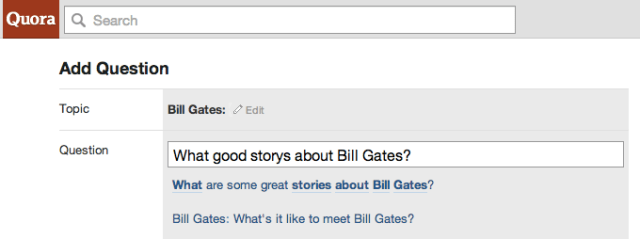Quora‘s library of knowledge has been trapped behind inadequate topic search, but now any keyword generates a list of frequently asked questions and answers about the subject thanks to today’s launch of full-text search on iOS and Android, and its web debut in March. Richer search became crucial as Quora usage is up 3X this year and it has grown to 350,000 topics, each with too many questions to browse.
Before the roll out of full-text search, Quora’s Marc Bodnick tells me “you would almost have to go off Quora” and use Google to find specific content. That’s not such a pain on the web, but one-third of Quora’s traffic comes from mobile where switching back and forth between apps is a pain. Now all of Quora’s users can search for the keyword “Winterfell” instead of the topic “Game Of Thrones”, or “engineer interview questions” instead of “recruiting”.
When users search for a specific word, they’ll get a list of 10 of the most popular questions or answers including that word. The results are essentially an auto-generated FAQ. Bodnick beams “Showing you the best 10 questions about a topic is a great way to start learning.”
 For example, searching for the Game Of Thrones’ northern castle “Winterfell” brings up frequently asked questions like “Why was Winterfell burned?”. The ranked list of results gives people an overview of a subject, showing them the best questions first, whereas browsing a topic factors recency and your friends into the question ordering. A search for “Bangkok” returns questions like “What are fun things to do in Bangkok?”, “What’s the best hotel?”, “What’s the best secret place?”, “Is it safe at night?”, and “What tourist traps should I avoid?”.
For example, searching for the Game Of Thrones’ northern castle “Winterfell” brings up frequently asked questions like “Why was Winterfell burned?”. The ranked list of results gives people an overview of a subject, showing them the best questions first, whereas browsing a topic factors recency and your friends into the question ordering. A search for “Bangkok” returns questions like “What are fun things to do in Bangkok?”, “What’s the best hotel?”, “What’s the best secret place?”, “Is it safe at night?”, and “What tourist traps should I avoid?”.
The reason the feature works at all is because of Quora’s question merging system. If users try to add a question that’s already been asked, Quora will direct them to the existing question. Users can also set duplicate questions to redirect to the canonical instance of the query.
This sets Quora apart from other Q&A sites like the long-standing and relatively terrible Yahoo Questions. There you’ll find questions with nearly identical meanings phrased in different ways (some with unintelligible grammar), fragmenting the knowledge they’re supposed to compile. The lack of proper question merging elsewhere hurts the user experience in many ways. It wastes people’s time asking questions that already exist when they could simply be pointed to existing answers. It dupes them into writing redundant answers. It divides a question’s audience so answers get fewer votes and the best answer is less likely to rise to the top. And it discourages deep answers because authors know their work won’t be found by people who would appreciate it.
Quora’s question merging and full-text search combine so people instantly get answers if their question has already been asked, know their invested effort will be fruitful, and congregate into a critical mass to vet answers. Bodnick tells me mobile search is Quora’s first big feature launching simultaneously on iOS and Android, though it took longer to launch because “we wanted to make it faster.”

With search comes a big monetization opportunity, as Quora could show ads targeted to people with serious intent to educate themselves about a certain subject. A search for “fly Hawaii” by someone looking for tips for the best way to reach paradise would obviously get advertisers for travel sites drooling. But Quora won’t be showing any search ads for now. Bodnick tells me Quora priorities don’t include making money yet.
Instead it’s focused on “growth, making the product great, and mobile. Our general view is that in creating a great site of knowledge, your goal is to get as much knowledge as possible. That should create significant financial opportunities for the company, but we’re not worried about the specifics right now.” Thanks to its $50 million Series B led last year by Quora’s founder and CEO Adam D’Angelo, the site doesn’t need to rake in cash right away. Momentum is strong, though, as D’Angelo said yesterday in a video about working at Quora “we are three times bigger than we were a year ago on all of our usage metrics.”
The mission to grow the world’s knowledge isn’t limited to Q&A. A few months back Quora launched a blogging platform, and Bodnick tells me the feature’s traction “is growing with the site. We keep growing and attracting new bloggers.” It doesn’t sound like it’s gone massively viral, but is a smart addition to the site. “There’s lots of blogs about design, photography, politics, sports, movies, and finance” Bodnick says. Their posts are also indexed in search, giving an even wider audience to people who have insight to share but don’t have a huge Twitter following or public presence.
Quora’s quest to teach has attracted a team that’s grown to 50 and will go up by 15 by the end of the summer. Bodnick says his squad isn’t antsy to get the dollars flowing. “The people we hire believe in the company, believe in the mission, and are overwhelmingly long-term oriented.” Quora’s talent could chase an acquisition and a huge payday elsewhere, but some people just want to watch the world learn.
Download the updated Quora for iOS and Android, which now include full-text search
